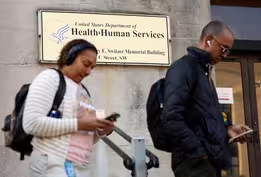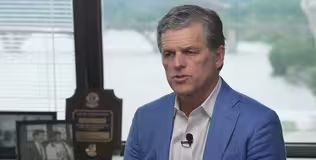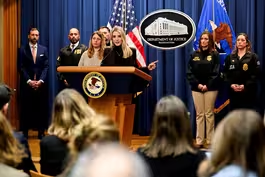
Trump confronts South African president with baseless claims
Clip: 5/21/2025 | 7m 34sVideo has Closed Captions
Trump confronts South African president in tense Oval Office meeting
A stunning scene unfolded in the Oval Office as President Trump met South African President Cyril Ramaphosa. Trump unexpectedly played videos that he says prove his claims that South Africa is committing genocide against white farmers there. The South African delegation pushed back and denied the claim in the historically tense meeting. Nick Schifrin reports.
Problems playing video? | Closed Captioning Feedback
Problems playing video? | Closed Captioning Feedback
Major corporate funding for the PBS News Hour is provided by BDO, BNSF, Consumer Cellular, American Cruise Lines, and Raymond James. Funding for the PBS NewsHour Weekend is provided by...

Trump confronts South African president with baseless claims
Clip: 5/21/2025 | 7m 34sVideo has Closed Captions
A stunning scene unfolded in the Oval Office as President Trump met South African President Cyril Ramaphosa. Trump unexpectedly played videos that he says prove his claims that South Africa is committing genocide against white farmers there. The South African delegation pushed back and denied the claim in the historically tense meeting. Nick Schifrin reports.
Problems playing video? | Closed Captioning Feedback
How to Watch PBS News Hour
PBS News Hour is available to stream on pbs.org and the free PBS App, available on iPhone, Apple TV, Android TV, Android smartphones, Amazon Fire TV, Amazon Fire Tablet, Roku, Samsung Smart TV, and Vizio.
Providing Support for PBS.org
Learn Moreabout PBS online sponsorshipGEOFF BENNETT: Welcome to the "News Hour."
A stunning scene unfolded in the Oval Office today, as President Trump met with South Africa's president and unexpectedly played videos that Mr. Trump said proved his allegations that South Africa is committing genocide against white farmers there.
The South African delegation pushed back, denying the debunked claim.
Here's Nick Schifrin.
QUESTION: What would it take for you to be convinced that there's no white genocide in South Africa?
CYRIL RAMAPHOSA, South African President: Well, I can answer that for the president.
NICK SCHIFRIN: Today, South African President Cyril Ramaphosa took a leap of faith.
CYRIL RAMAPHOSA: It will take President Trump listening to the voices of South Africans.
NICK SCHIFRIN: Convinced he could change President Trump's mind on live TV.
CYRIL RAMAPHOSA: It will take President Trump to listen to them.
NICK SCHIFRIN: At first, he was ambushed.
DONALD TRUMP, President of the United States: Turn the lights down and just put this on.
It's right behind you.
NICK SCHIFRIN: President Trump used videos of radical South African politicians calling for racist violence.
MAN: Go after a white man.
NICK SCHIFRIN: And newspaper clips.
DONALD TRUMP: Death.
Death.
Death.
NICK SCHIFRIN: To back up his claim of genocide against white farmers, dozens of whom recently arrived in the U.S. as refugees.
DONALD TRUMP: They're taking people's land away, and in many cases, those people are being executed.
NICK SCHIFRIN: At first, Ramaphosa appealed to facts.
South Africa's Parliament includes small radical parties who aren't in government, and white Afrikaners, an ethnic minority that created and led the now defunct apartheid regime, are being killed alongside Black farmers because of crime, not racism, according to police data.
DONALD TRUMP: When they kill the white farmer, nothing happens to them.
CYRIL RAMAPHOSA: No, there is quite... DONALD TRUMP: Nothing happens to them.
CYRIL RAMAPHOSA: There is criminality in our country.
People who do get killed, unfortunately, through criminal activity are not only white people.
Majority of them are Black people.
NICK SCHIFRIN: At that point, things could have fallen apart, like they did with Ukrainian President Volodymyr Zelenskyy.
DONALD TRUMP: It's going to be a very hard thing to do business like this.
NICK SCHIFRIN: Zelenskyy left his Oval Office train wreck without the deal he came to sign.
DONALD TRUMP: This is going to be great television, I will say that.
NICK SCHIFRIN: Ramaphosa could have appealed to gifts.
CYRIL RAMAPHOSA: I'm sorry I don't have a plane to give you.
DONALD TRUMP: I wish you did.
I would take it.
(LAUGHTER) NICK SCHIFRIN: But he kept the mood light and brought his own Trump cards, South African golf champion Ernie Els, who's played with Trump.
ERNIE ELS, South African Professional Golfer: There's a lot of coexistence going on and help from a lot of areas.
But we need -- I feel we need the U.S. to push this thing through.
NICK SCHIFRIN: And South Africa's richest man, Johann Rupert.
JOHANN RUPERT, South African Businessman: Remember, sir, you and I lived in New York in the '70s.
We never thought New York would be what it became.
We have got gang warfare, like your M33, what -- with these guys.
We have got equivalents there, but we need your help, sir.
And we need Elon's technology.
NICK SCHIFRIN: South African-born Elon Musk, part of the American delegation, leads satellite Internet provider Starlink.
DONALD TRUMP: You don't want to leave.
(LAUGHTER) NICK SCHIFRIN: And so the tension appeared defused, and President Trump could participate in the South African-led G20 summit, which the U.S. has said it would boycott, Ramaphosa said late today.
CYRIL RAMAPHOSA: There's a firm agreement and undertaking that we're going to continue engaging.
So there's no disengagement.
NICK SCHIFRIN: Ramaphosa called the meeting a - - quote -- "great success" and said the two sides would conduct negotiations over trade and increase U.S. investment to South Africa.
GEOFF BENNETT: A great success.
I mean, the meeting ended more cordially than it started, but did they resolve the fundamental disagreement over white farmers?
NICK SCHIFRIN: No, and it's a great point, Geoff.
I mean, tonight in his press conference, Ramaphosa emphatically said that there is absolutely no genocide happening in South African.
And what's at issue here, just to step back, is a legacy, of course, of apartheid, when the government dispossessed many Black South Africans' land.
For the last 30 years or so, since the end of apartheid, the government has tried to redistribute that land mostly by purchasing land from willing white settlers, but it hasn't solved the problem.
Today, Afrikaners only represent about 7 percent of the population, but own more than half the land in South Africa.
And so a new law is designed to take land from white farmers, basically eminent domain, as we call it here in the U.S., but with what South Africa says are provisions for compensation, for due process.
And as we heard today, Geoff, South Africa's argument is that the violence is not about race.
It affects everyone, really more about class.
GEOFF BENNETT: And, Nick, when you talk to your sources, when you talk to experts in the field, what are they telling you about what this moment means for the U.S. and South Africa and for the region more broadly?
NICK SCHIFRIN: When you talk to the president's advisers -- he didn't necessarily focus on this today.
When you talk to the president's advisers, they will say that the context is a larger conflict with South Africa.
They talk about a trade deficit that the U.S. has with South Africa.
They talk about South African ties with Moscow and Beijing, and they talk about South Africa's pursuit of Israel, specifically accusation in the International Criminal Court of justice that Israel is committing genocide.
And those larger questions today have not been answered, says Joshua Meservey of the Hudson Institute.
JOSHUA MESERVEY, Hudson Institute: They have pursued Israel at the ICJ.
The South Africans will say they are morally obliged to do this, given their own history.
That sounds great, except when you consider that the South African government and the dominant African National Congress has diplomatically supported some of the most violent and awful regimes in the world.
So there's a very stark double standard that I think is less and less accepted in Washington.
NICK SCHIFRIN: But, Geoff, critics of the president say, President Trump's use of the word genocide, his inviting Afrikaner refugees to come to the United States, while simultaneously blocking African and other refugees from coming to the United States, undermines a sense of national cohesion in South Africa, but also the understanding of the United States across Southern and Central Africa, says Mvemba Phezo Dizolele of CSIS.
MVEMBA PHEZO DIZOLELE, Center for Strategic and International Studies: The U.S. is being seen as a big country with a lot of power that is trying to bully a smaller country for a reason that is more fictional than it is reality, to serve another interest that is non-African.
So, for Africans, when they look at this, they say, if the U.S. can do this to the largest functional economy on the continent, people don't feel particularly a lot of good will towards the U.S., and they're not feeling that the U.S. is really acting as the leader that it ought to be.
NICK SCHIFRIN: And critics, Geoff, say that action, those actions, as seen from the critics of the United States, undermines some of the U.S.' larger strategic goals across Africa, whether that's stability, especially in Central Africa around Sudan, but also U.S. attempts to counter Chinese influence, which has been growing across the continent.
GEOFF BENNETT: Yes.
Nick Schifrin, thanks so much for this reporting.
We appreciate it.
NICK SCHIFRIN: Thank you.
The background of surgeon general nominee Casey Means
Video has Closed Captions
Clip: 5/21/2025 | 6m 29s | The background and career of Casey Means, Trump's pick for surgeon general (6m 29s)
Barry Diller shares personal story in new memoir 'Who Knew'
Video has Closed Captions
Clip: 5/21/2025 | 6m 25s | Barry Diller shares personal story and chronicles remarkable career in 'Who Knew' (6m 25s)
Former educator works to restore dignity to disagreements
Video has Closed Captions
Clip: 5/21/2025 | 8m 3s | Activist and former educator works to restore dignity to political disagreements (8m 3s)
How the DOJ under Trump is targeting political adversaries
Video has Closed Captions
Clip: 5/21/2025 | 7m 33s | How the DOJ under Trump is targeting his perceived political adversaries (7m 33s)
Minneapolis reflects on changes 5 years after George Floyd
Video has Closed Captions
Clip: 5/21/2025 | 9m 10s | Minneapolis reflects on changes 5 years after George Floyd's murder (9m 10s)
Providing Support for PBS.org
Learn Moreabout PBS online sponsorship
- News and Public Affairs

FRONTLINE is investigative journalism that questions, explains and changes our world.

- News and Public Affairs

Amanpour and Company features conversations with leaders and decision makers.












Support for PBS provided by:
Major corporate funding for the PBS News Hour is provided by BDO, BNSF, Consumer Cellular, American Cruise Lines, and Raymond James. Funding for the PBS NewsHour Weekend is provided by...




